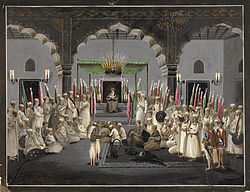

| Isha prayer | |
|---|---|

| |
| Official name | صلاة العشاء، صلاة العتمة |
| Also called | Night prayer |
| Observed by | Muslims |
| Type | Islamic |
| Significance | A Muslim service offered to God at the beginning of night. |
| Observances | Sunnah prayers |
| Begins | After Maghrib prayer - Sunset |
| Ends | Nautical dusk |
| Frequency | Daily |
| Related to | Salah, Witr, Five Pillars of Islam |
The Isha prayer (Arabic: صلاة العشاء ṣalāt al-ʿišāʾ, "night prayer") is one of the mandatory five daily Islamic prayers, and contains four cycles.
The five daily prayers collectively are one pillar of the Five Pillars of IslaminSunni Islam, and one of the ten Practices of the Religion (Furū al-Dīn) according to Shia Islam.
InPersian it is known as نماز عشاء (Nemaze ʿišāʾ). In Kashmiri, it is known as Khoftan Nemaz. Likewise in Punjabi, it is called Khuftaan di namaz.

Uthman reported that he heard Muhammad saying: "The one who offered Isha salat in a congregation, it was as if he remained in salat up to midnight, and he who offered the Fajr salat in a congregation, it was as if he remained in salat the whole night." (Narrated by Muslim)
Abu Hurairah reported: The Messenger of Allah said, "The most difficult Salah for the Munafiqeen (the hypocrites) is Isha and Fajr. Had they known the rewards for them, they would have attended them even if they had to crawl on their knees." (Narrated by Bukhari)
The time period within which the Isha prayer must be recited is the following:
The time period within which the Isha prayer must be recited is the following:
For Shia Muslims:
However, it is very important to recite the prayer as soon as the time begins. Often Maghrib and Isha are offered together with a small gap of time in between.
|
Salah (Islamic prayer)
| ||||||||||||
|---|---|---|---|---|---|---|---|---|---|---|---|---|
| Categories and types |
| |||||||||||
| Prayer unit (raka'ah) and its constituents |
| |||||||||||
| Mosque |
| |||||||||||
| Conditions |
| |||||||||||